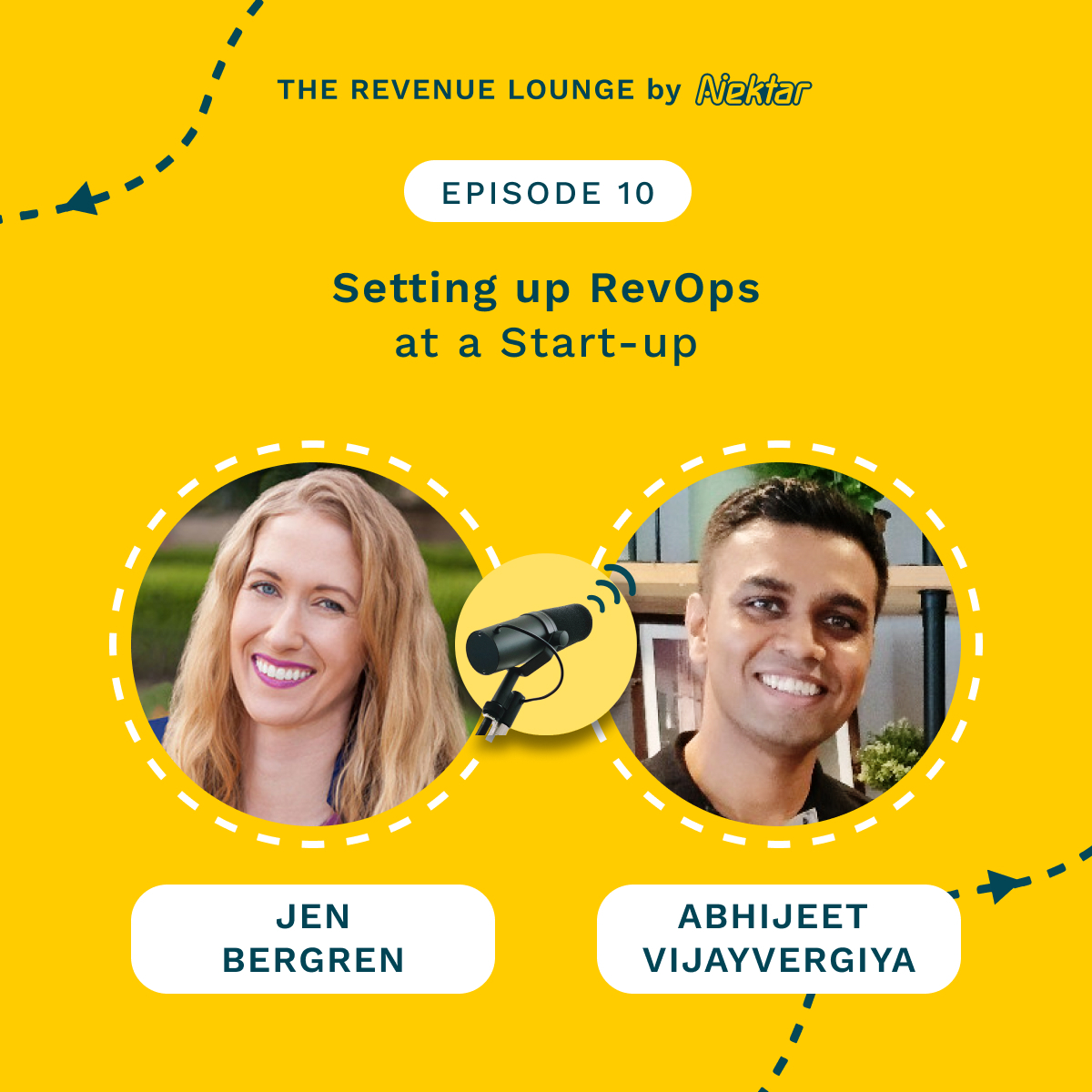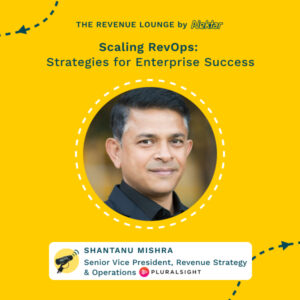Ep #8: Setting Up a Successful CRM Implementation Process ft. Craig Handy
May 24, 2023
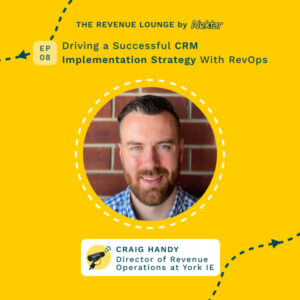
About
The Revenue Lounge
The podcast covers stories from leaders across RevOps, Sales, Customer Success, GTM, Data and Marketing about what drives these functions and what advice they would share with our listeners. With 3 seasons recorded, the podcast currently features 50+ enterprise leaders in the B2B SaaS domain. Tune in to hear from the best in the business
Welcome to Season 2 Episode 8 of The Revenue Lounge Podcast by Nektar.ai – A series of interviews with top Revenue Operations leaders on what drives the function and what keeps them going!
Episode Guest – Craig Handy
https://www.linkedin.com/in/craigjhandy/
Episode Host – Bhaswati B
https://www.linkedin.com/in/bhaswati-bhattacharyya-9307768b/
Podcast Details:
Podcast page – https://nektar.ai/podcasts/
Spotify – https://open.spotify.com/show/3DUOqnTpPOJ2xbyl7HdgN3
Google Podcasts – https://podcasts.google.com/u/0/search/the%20revenue%20lounge
Apple Podcasts – https://podcasts.apple.com/in/podcast/the-revenue-lounge/id1645044872
Episode Details:
A bulky and complex tool – the CRM is a steep investment for companies. But deriving ROI from a CRM can be quite challenging. As there are several factors that are always at play to make CRM implementation fail such as a lack of vision, poor planning, bad data, siloed functioning of departments, poor user adoption.
To make CRMs actually deliver value for revenue leaders, it needs to have an implementation strategy that takes care of all things that can go wrong. And RevOps teams can own this task end to end and make sure their CRMs give them the ROI and the value that it was originally purchased for.
In today’s episode, we are going to talk to a CRM implementation expert who will take us through how RevOps can drive a successful CRM implementation strategy.
Today’s guest is Craig Handy, who is the Director of RevOps at York IE. Craig has been building innovative revenue engines for tech companies. After handling RevOps at companies like Assent Compliance and Shopify, he now helps bring winning go-to-market strategies to smaller companies in an affordable way.
Want to learn more about Nektar?
Talk to our team – https://bit.ly/3MishjZ
#crmimplementationprocess
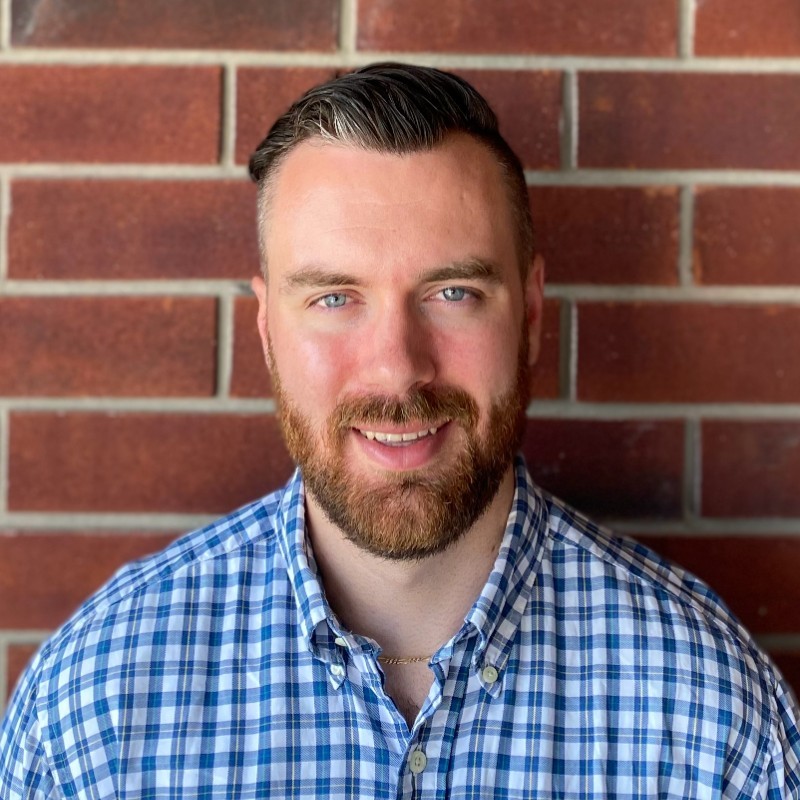
[00:00:00] Hello everyone. Welcome to the Revenue Lounge podcast. I’m your host Bhaswati, and in today’s episode, we will be talking about an issue that might be keeping most rev op folks up at night that is successful CRM implementation. As we all know, the CRM is a bulky and complex tool, and it is of course a very steep investment for companies.
[00:00:22] But deriving ROI from a CRM can be quite challenging. As there are several factors that are always at play to make CRM implementation fail, be it a lack of vision, poor planning, bad data, siloed, functioning of departments, and of course the biggest of them all. Poor user adoption. And to make CRMs actually deliver value for revenue leaders, it needs to have an implementation strategy that takes care of all the things that can possibly go wrong.
[00:00:51] And Revops teams can own this task end-to-end and make sure that their CRMs give them the ROI and the value [00:01:00] that it was originally purchased for. So in today’s episode, I’m very excited to be talking about CRM implementation with an expert who will take us through how Rev Ops can drive a successful CRM implementation strategy.
[00:01:14] We have Craig Handy today who is the director of RevOps at York IE. Craig has been building innovative revenue engines for tech companies after handling rev ops at companies like asset compliance and Shopify. He now helps bring winning go-to-market strategies to smaller companies in an affordable way.
[00:01:34] Hi Craig. Thank you so much for joining us today. We are very excited to learn from you. I’m super excited to be here and thanks for having me. We can start by you telling us a little bit about your current role at Yokai.
Perfect. Yeah, absolutely. I’ve been at YorkIE since I think what, September, 2022. And what, what it realistically was, I had a company called Jameson Strategies.
[00:01:55] Which was a revops consulting company on the side. And I’ve been doing [00:02:00] that back, even when I was at Assent Compliance and, you know, just kind of did it off the side of my desk. And my, my co-founder and I, everything was going really well. We were growing, we were getting to a point where we weren’t kind of gonna be able to do it off the side of our desk, as well as having, you know, normal full-time jobs, but kind of around, you know, closer to September.
[00:02:17] We had a mutual client who, with YorkIE and, and they said to us like, Hey, we want to get into this and we actually just want you to do it. And so we thought, okay, well this is a fun opportunity to hedge our bet and, you know, both reduce risk, but also get this new really exciting opportunity. And so Yoka acquired, uh, company James Strategies and then we’ve jumped into that.
[00:02:36] So my role though, specifically at YorkIE. It’s sort of a fun one because I get to do rev ops. Uh, for York IE. Which is great. So do doing the classic internal rev op. But then the nature of our businesses, I lead our go to market and rev ops consulting practice and so we will work with both our portfolio companies cuz Yoekie deploys the capital to seed in Series A companies as well as companies that are outside of our [00:03:00] portfolio, just any business whatsoever, but focusing a lot in the tech space, focusing in b2b.
[00:03:05] And we’ll help businesses that are all the way from pre-revenue all the way to, you know, locking down their series B or beyond. With getting their systems, their process, their technology, and their data together, and it’s both a incredibly fun and rewarding opportunity and role. But I think that the big thing I come back to is, you know, everything that we do with every different client, there’s so many things that repeat, but oftentimes it’s a different flavor or a different different lens that we have to approach a business model that I find exhilarating, and I find that every day.
[00:03:36] Is familiar but different. And that keeps me going. That keeps me excited. Yeah. That’s really good to know. Maybe we can have another session with you on how every business is different and how every business requires a customized approach. So moving on to my favorite question that we ask every guest on this podcast is, How do you define revenue operations?
[00:03:56] For sure. Yeah. So I, whether I define it [00:04:00] differently than maybe the more, more popular trend is or, or not, I’m not totally sure. But for me, rev ops is three main things. Rev ops to me, first is about obsession around bio centricity. I think that. You know, revenue operations, ultimately their responsibility is to ensure that a business in the best way possible is generating revenue.
[00:04:21] Or, you know, one of the things too that, that I’ll really find is there’s a, there’s a term out there called like growth ops. That’s rev ops too, but that’s businesses that are not optimizing for revenue. They’re optimizing for platform growth, which will turn into revenue, but, Same thing, but, but ultimately it’s what are all of the things that are going into doing that and, and doing that intelligently and doing that, you know, in, in the best way possible.
[00:04:43] And so to do that, the best way possible, in my opinion, rev Ops needs to be obsessed with bio centricity. So aligning. Your entire go-to-market process to how the buyer buys. The second thing is about what I generally refer to as good revenue operations is the unification of people, process, [00:05:00] technology, and data.
[00:05:01] And when all four of those things come together, what we’re ultimately creating there is. A really strong balance and, and build off of one another so that, you know, the technology is supporting people and people have a clear, logical process that aligns with the buyer and the data that both they’re generating and utilizing is building a data asset and avoiding data liabilities.
[00:05:21] And then the technology, again, supports that and everything’s cyclical in that sense. And the third thing on that is rev ops to me is, is I like to refer to the three Rs and it’s not reduce or reuse, recycle, but those are important things. But the three Rs of rev ops is right person, right time, right way.
[00:05:35] And I see that both internally and externally, but ultimately is, are the right people engaged in the right possible way? And is the timing right in that? And so when we think about from a prospect standpoint, you know, are we speaking with the right people? Are, are we communicating the way that best aligns with their buying process or, or, or their behavior?
[00:05:52] And then of course, timing is probably the big elephant in the room when it comes to, you know, winning deals. And in that scenario, are we reaching out to our customers when they need [00:06:00] us and, and, and reaching out to our prospects in the right time for them to actually understand that. And I think rev ops.
[00:06:04] Across all of the go to market needs to be, you know, the one that’s driving that and owning that across the board. So that’s kinda how I define it. It’s not sales ops, it’s not marketing ops, it’s none of those things. It’s his own realm. Yeah. I love the point you made around unification of people, process, tech, and data.
[00:06:21] Something that is so crucial, especially in 2023 when the priorities of revenue leaders have. Also changed because of budget freezes and the uncertain climate. So really relevant to the time that we are in right now. Moving on to the next question. How did you get into Rev op? What’s your story? Yeah, accidentally, that’s the main answer to that.
[00:06:42] So in university I, I was kind of thinking two path I want, I always wanted to get into politics and I fell very much out of love with that. I have no interest in it anymore and really it upsets me honestly. And the other thing was I did my undergrad in psychology, and my intention was to go do the full PhD and [00:07:00] specifically get into a field called organizational psychology or industrial psychology.
[00:07:04] And I envisioned this world where I was gonna go into a business and I watch it and review it for a couple months, and then I would come back and say, all right, listen, you need to. Paint the walls of this color, change the ambient temperature up by a certain percentage, move this department here, move that department there, separate these people, and basically get into like this level of business ergonomics that was both emotional and mental and physical to try and get that peak performance.
[00:07:28] And I did my little grad thesis thing on, uh, you know, middle management and then the separation of two businesses that are identical, like, you know, same access to talent, same access to. You know, same revenue, same technology. What separates the good from the great and that, you know, margin and inches, those micro changes is what separates it.
[00:07:47] But long story short, I was done with the university. I had nothing to do with that. I did not wanna follow that route. And luckily, I had a good friend of mine who was a tech founder of ST. Compliance, actually one of the founders there. And he said, why don’t you come work with me? And [00:08:00] I did not know.
[00:08:01] Anything about tech? I didn’t know anything about B2B business. I never crossed my mind and I got thrown into it and you know, did a few different roles there. Most notably, I was a BDR for a little bit. I hated it. But I think everybody should be a bdr. It’s the best stepping stone, the mad respect for anybody who goes through that and does that.
[00:08:19] But I started to notice I was helping everybody out with their technology. I was writing emails, I was. You know, redesigning our process. I was a spreadsheet wizard. I was doing all these different things and luckily had a mentor early on who kind of pulled me out of that BDR pit and he said, you know, I want you to manage our sales loft.
[00:08:36] And then he was like, well, I want you to manage our sales force. And then, oh, you did a great job with the data, let’s. Why don’t you go look at HubSpot? And so I started kind of, you know, figuring all these things out. Not a traditional training, but it was trial by fire. It was, go figure this out and make it work.
[00:08:49] And I’d come up with a bunch of different ways to do it. And some of them were great, some of them were horrible, some of them were fantastic. And that kind of gotten to this point where it doesn’t matter what it is, we’ll figure it out, we’ll make it [00:09:00] work. But I took the approach instead of, you know, By the book specifics, but rather to come up with creative unique ways.
[00:09:06] And that’s what I fell in love with because to me it was like organizational psychology without the PhD, but specifically it was inside this, this column of, of go to market. And, and you know, so the walls became the technology and the. You know, the departments where they were sitting became the people and the ambient temperature was the process.
[00:09:25] And so all those things came back where I ended up doing what I wanted to do and what I loved, it was just in a completely different medium, and then how I enact that. So yeah, long story short, that that’s how I got there. So it’s totally my accident, but I, I wouldn’t have it any other way. Yeah. That’s a brilliant background.
[00:09:38] I mean, we talked to so many rev ops leaders, right, for the podcast and otherwise as well. And what’s fascinating is everybody comes from. Such unique backgrounds and it’s mostly by accident that you fall into the lap of rev ops and start enjoying it and you figure out that you’re so passionate about different areas.
[00:09:54] Personally, I have not spoken to anyone who comes from a psychology or politics background, but yeah, that very, very [00:10:00] interesting to know. Thanks for sharing that. So like I was mentioning, you know, a lot has changed for revenue leaders in the last one year. The market has been unforgiving and the uncertainty in the market has kind of changed a lot of priorities for business leaders.
[00:10:14] So given all that is currently out there, what is your biggest challenge today as a Rev ops leader that you face? For sure. I don’t know if I can narrow it down to one, but I will say two and I’ll condense ’em a little bit. But the two things that stand out to me first and foremost is in, in my space in particular when I’m consulting with businesses, there are a wide range of different characters that you’ll work with and, and I think that.
[00:10:39] That in and of itself is both a benefit and a drawback in that there are some, let’s call ’em best practices or things that we know work or stuff that we know don’t work. But you’ll get some folks that have a perspective that either doesn’t respect the craft of rev ops or, you know, doesn’t respect, uh, traditional operations functions or has done something a [00:11:00] particular way at a particular company in the past and just wants to replicate this again.
[00:11:04] And so I think the challenge is, is that, you know, how do you. Both contribute positively in an, in interaction, in an engagement while also, you know, standing firm on the fact that from a delivery standpoint, you’re trying to deliver value. And there isn’t always a right or wrong way to do it, but there is, you know, uh, smart decisions and there is smart things that that, that you can do.
[00:11:25] And so I find from a rev ops person is as the. The field is establishing itself and as rev robots becoming more prevalent, you know, one sales leader or one marketing leader’s understanding of what Rev Ops does or their past experience with, you know, maybe someone who really is sales ops and just put on a, I’m a rev ops hat versus someone who has done it a different way.
[00:11:44] It’s that there’s some bad taste in the mouth and whatnot. So navigating that. Has always been a challenge to build that trust up. And also, you know, people are basically opening up their CRMs, they’re opening up their go-to-market methodologies and sometimes they’re being criticized on them and [00:12:00] and whatnot.
[00:12:00] And that’s not always an easy thing to engage, but you know, we persevere and we do it. The other thing that is not specific to me, and I think, I think it’s just generic across the board for the field is, and you touched on this earlier, is in the market we’re in today. People are kind of stepping away from the point solutions.
[00:12:17] The money’s not flowing as easy to different tech or different initiatives. Marketing is being pulled from their budgets, which is the worst thing, but it’s happening. So from a rev op standpoint is you may know what you want to do. You may be like, Hey, this is the best way to do it. But your budget or the appetite of risk in the company will only get you a quarter of it.
[00:12:37] And so from a rev up standpoint, it’s like how do we take what we do have and mould that into something that’s gonna get us as close as possible to what we want? And sometimes that means not doing the thing you think is best, but rather doing the thing you think is second best. Mainly because you can fully do it or you can fully invest in, or you can fully experiment with it.
[00:12:54] So it’s a constant song in dance. And I don’t think it, it doesn’t benefit tech companies that are innovating. It doesn’t. Benefit the [00:13:00] companies that are trying to close steals, and it even doesn’t benefit the buyers of these different products and whatnot. But rather as everything, all the purse drinks start to tighten it, it becomes a real big challenge, I think, to find the best path forward that gives you as much as you possibly can with without, you know, going overboard or, or breaking the bank or, or feeling that you’re blocked.
[00:13:18] So that’s a universal challenge, but I do believe rev ops professionals are actually the best suited to solve that. So a problem, but a good problem to have. For. That’s very insightful and I love this pin you gave there about how it’s not like a linear journey. It keeps changing constantly and especially in the current climate, it’s almost like since 2020 we have been on the offensive.
[00:13:42] So much has changed. And yeah, that really makes sense when probably what has been working so far might not always be the way to go forward. So let’s jump right to the topic of, of the data. We are going to be talking about the actual elephant in the room, which is the crm. So before we get into the [00:14:00] implementation part of it, we have to touch upon the HubSpot versus Salesforce debate if you’re talking about crm.
[00:14:05] So what are your thoughts there, Greg? So it’s funny that this conversation’s becoming like more and more prevalent and I’m seeing this on LinkedIn all the time. And to be honest, it drives me nuts cause it’s like we’re trying to compare. In my opinion, apples and oranges, in some scenario, we’re comparing apples and apples, but we have no context o over what the situation actually is.
[00:14:26] And, and so what I mean by this is if you’d asked me this five years ago, I would say no questions asked. Hands down, Salesforce is be best platform. One of the lines that I, I don’t know where this came from, but no one ever got fired buying Salesforce hands down. And I love playing in it. I love building in it.
[00:14:43] I thought it was fantastic. Fast forward to today. There’s a few things that stand out to me. One is HubSpot has gone leaps and bounds forward, so they are now. Incredibly viable. They’ve always been great from a marketing automation platform, but they’re now incredibly viable from a CRM standpoint as [00:15:00] well, to a point where, in my opinion, it’s very strong.
[00:15:03] On the flip side too, Salesforce I think, has had such massive success that more businesses, uh, that would never have ever thought about that are also thinking, oh, well, you know, I’m in business, I’m in b2b, or, or sometimes I’m even, you know, B2C or, or b2, b2c. I should get Salesforce. Cuz that’s the thing you do right.
[00:15:21] And what ends up happening too is that Salesforce for, for all of its power also now has folks that don’t need that and actually are being confused by that or, or not. The ease of use of rolling something out. Uh, and then being kind of have a bad taste on the mouth. So the scenario that I see here is it really depends on what the business needs is, what it is that they’re trying to achieve, the types of folks that work at the business.
[00:15:45] All of those things help dictate it. I would never go into a business and say, oh yeah, you should get Salesforce, you should get HubSpot without knowing what are you doing? And there are many scenarios where HubSpot’s gonna be better. Hands down, many scenarios, HubSpot’s gonna be better. There are [00:16:00] also many scenarios where hub sweat’s not gonna be able to achieve what you need to do, and therefore Salesforce is going to be your long-term scale, your your better option overall.
[00:16:07] So I love ’em both. I love it when I get a HubSpot marketing and Salesforce CRM client. But I love it when I have everything in HubSpot. I also love it when everything’s in, in Salesforce and Marketo or something else. But that’s really for me, is it, it, it totally depends. And if you’re saying you like one better or one’s better in general, or these people that are all like on the HubSpot camp versus the Salesforce camp, you’re not doing a, a service to your clients for that.
[00:16:33] And you’re also not critically thinking of. Like, you know, they’re both very useful. So get off that and focus on what the needs are and then align it to the right tool that fits that. Right. Thanks for sharing that. I’m sure that will give a lot of perspective for people who’ve been following this debate.
[00:16:50] So let’s move on to the topic then. My next question is, in your experience, what are the biggest reasons that you have seen that? CRM implementations fail. I think [00:17:00] there’s three big ones that stand out. The one that comes to mind, like right outta the gate, of course, is the training piece. And I don’t think it’s the biggest one, so I’ll touch on it quickly, but it is a scenario where you roll something out and you just assume people are gonna just know how to use it and, and the problem with that, of course, is.
[00:17:22] That that’s generally not the case, especially if you’re relying on the fact that, you know, one Salesforce or one HubSpot implementation versus another company’s implementation could be drastically different. So if you’re relying on the fact of, Hey, I used to use HubSpot, or I used to use Salesforce, I know how it worked.
[00:17:39] And I mean, no offense by this, but one of the examples I’ve had is anytime that I’ve been in working with a business that has Salesforce and they hire X Salesforce sales reps, They’re the worst Salesforce users ever. And the reason for that really is that Salesforce has a very unique way that they use their own technology.
[00:17:57] And when they try and apply that into a way another business [00:18:00] has it, it’s kind of like, well, I’m from Salesforce. I know the way it works. Not quite the case. So from a training standpoint, it’s are we setting up our, our users, our, our team, our administrators, everything with everything they need to be successful?
[00:18:13] And not just stopping with like what we onboarded. Like are we consistently evolving that? And I think we’ll talk about that in a little bit more detail later. But the other one for me is the buy-in to actually. To make a change or to implement a, a, a crm. And one of the things that I, I like to say here is when there’s a problem or when there’s an opportunity present is work with your team, which is your users, your leaders, whoever, and validate and establish the need for change to begin with.
[00:18:43] We don’t want our salespeople say, Hey, we want Salesforce or, or we need to get Salesforce. What you’re setting up actually is we need to be able to maintain our deal pipeline. Yeah, we need to be able to see more clarity on our reporting so that we can know where to spend our, our money, where to spend our [00:19:00] time.
[00:19:00] Yeah, we have too many records. We can’t maintain this. All the spreadsheets are getting crazy. We’re missing things. When we establish as a team, this is a problem that we need to fix. Then the team is giving permission to whoever it is, you know, the founder or the ops people or whoever to go out and solve that problem.
[00:19:17] And the buy-in exists there to say, okay, we’ve done our research, we’re bringing in Salesforce, we’re bringing in HubSpot to solve this thing that we’ve all agreed on is the actual opportunity or problem. Um, and I think that the separation here is that when you lead from technology first, Generally, in my opinion, is not a, a long-term strategy.
[00:19:36] It’s not a substantial change and it will face a lot of backlash. But when you lead from the opportunity and problem space, that is kind of a universal understanding that, you know, the, that’s the goal. And then technology can come in and solve that, but never lead with technology to start with. So, so I think that’s the second piece.
[00:19:53] The third piece, which is ultimately. I think the one where I come in the most and is, is, is more interesting [00:20:00] to me is the business architecture side. And that falls under data governance, data stewardship data, the data structure, all the way to like, what are we building, what are we doing? And there’s a scenario where you can say, I’m gonna use one of these tools, vanilla out of the box.
[00:20:14] And that’s fine. A lot of them are, are built in a way that you can, you know, spin the Salesforce enough, split up and leverage it. But the reality is, is that when you. Do proper foundational work. In your CR r m implementation, you create the ability for that platform to adapt to the changing market in your growing business.
[00:20:32] And that means that one year, three years, five years down the road, you’re not all of a sudden crippled by dis thoughts or poor decisions you made years ago, but rather you’re, you’re comfortable because you’ve built this adaptable foundation. And to do that, you either need to have an in-house team that has that experience and, and has the ability to separate themselves from.
[00:20:52] You know, being two in the weeds and actually think about this from strategic lens, or you need to work with consultants or third parties that specialize [00:21:00] in extracting that business, the business intentions and, and the way the business is gonna operate. And understanding the market trends to build a type of thing that’s, that’s gonna be.
[00:21:09] Good for the business and, and be successful down the road. And sometimes it means changing the way a system’s being used. Sometimes it actually means reworking a little bit how the business strategy or business architecture is, but more often it’s a combination of both of those. And, and so I think that, you know, critically if you, if you miss that point, It doesn’t matter how bought in your team is or, or how well you train them if, if fundamentally the foundation’s broken it, it’s just gonna be headache after headache until eventually you, you rip it out or you stop using it, or it negatively impacts your business.
[00:21:39] And that’s the reality of that. I think that those are the three things that realistically to me, the biggest points of failure for implementations. Got it. So I just wanted to understand, what do you think about the users actually playing a key role in the selection, evaluation, and use? And later championing of the crm.
[00:21:58] I mean, ultimately [00:22:00] they’re gonna be the users, right? They’re gonna be the ones that you expect to actually leverage it. And I think as a philosophy I would have is that, you know, the CRMs only gonna be as good as the people that are in there leveraging it. And, and that’s, that’s bar like a self-serve model where the CRM runs itself.
[00:22:15] But then you kind of argue do you need a CRM at that point? But the the sense is, is that if you have people that are interacting with your CRM that are driving your business forward, There’s no point in forcing something down their throats if that’s not going to work for them or that’s not going to accelerate, you know, their success.
[00:22:33] And I think about this way, I start most of my engagements when I’m speaking with sales folks or marketers or whatnot. And the main intention here is I’m not trying to create a system that forces you to do extra work and doesn’t give you anything back. I’m not trying to create a system that is just a, a system of record that goes into the abyss and no one ever looks at it again, but rather, we are doing something here that you should say, oh, thank, thank goodness that we have Salesforce.
[00:22:59] It makes me [00:23:00] such a better salesperson. Or, oh, I’m so happy I have HubSpot. I’m able to, to hit my quota and bring in needs way better. Thank goodness it’s here. If the team isn’t saying that at the end, then I think we’ve missed something or, or the business never needed it in the first place. And that critically is, is really important.
[00:23:16] Where you wanna avoid some scenarios is, is that salespeople are not business architects for the most part. I mean, there’s great ones in there or future ones in there, but they’re not business architects or the bdr. It’s not a business architect, but rather when you’re working with them to extract.
[00:23:31] Feelings, opinions, thoughts. When you try and get under, you know, in their head and their perspective and help them to articulate that, then that allows you as a business architect to design something that’s gonna best serve them for their needs, both today and what they’re gonna grow into. And so I think it’s keep them involved, keep them included, keep them engaged, leverage them as best as you possibly can and make sure that they’re aligned with what’s happening, but they’re not.
[00:23:56] You know, they have a, they have a day job, they have expectations and stuff that they need to deal with, and they’re [00:24:00] not the ones that are in there designing the system. So it’s a healthy balance, but I think nonetheless it’s super important that, that they are to, to to many degrees. Got it. So moving on to the training part of it, I’ve seen that you are a big advocate of training on tools that are implemented.
[00:24:16] So what would you advise Rev op leaders. To adopt as a practice when it comes to treating CRM training as a continuous exercise. I’ll tell you little story here. I think an eye opening scenario was a very large client of ours. We did a little survey with them to try and bring out, you know, the usage statistics of their crm and we discovered that the people that had been at the company for five plus years were.
[00:24:43] Equally as confused and unhappy with technology as the folks that had just started like a month or so ago, and it kind of peaked around one year, year and a half in their level of under or their self-reported level of understanding. And what that [00:25:00] really tells me is that we spend a lot of time when someone joins a company, especially if they’re bigger, smaller companies, less so, but when they’re bigger, we invest in this training and, and a training is called onboarding.
[00:25:11] And the thing about onboarding is once it’s done, it’s over. So then three, four years down the road, your CRM is constantly changing. You’re evolving it, you’re modifying, you’re adjusting it, but we’re only just onboarding new people in this particular way. So how is it that we’re keeping our existing team.
[00:25:28] Up to speed and up to date on all these different changes. The other challenge, and I was guilty of this and my role actually at Ascent when I first started was, you know, you, you would do like an initial training, but then you would say, go sit with this, you know, fellow bdr, this fellow account executive, and they’ll show you how it actually works in practice.
[00:25:45] And I’m big enough to admit I couldn’t be bothered in spending time repeating this. I was like, oh, I’m not gonna do all this training. Like I got other stuff to do. And what ends up happening is you get this sort of tribal knowledge where you know, Ken Executive does it this way, or cuts this corner, shows the next one, and then it’s like a broken [00:26:00] telephone where all of a sudden you’re like, what?
[00:26:01] What are you doing here? This who taught you this? This doesn’t make any sense. So, I think one of the best things that you can do for yourself is ensure that your entire user base both understands what their tools and tactics and strategies are available to them, what their options are. Because ultimately, my objective is, I have many objectives, but one of the big ones is the folks that are customer facing that are actually trying to like, you know, generate leads, close deals, keep customers happy.
[00:26:27] I, you know, I want to make them as successful as possible. That’s my duty, that’s my responsibility. And so in doing that, I need to make sure that any change I make, any new functionality I add in that I’m disseminating that and I’m reiterating that, and I’m showing that everybody has a, a fair and, and, uh, equal opportunity and understanding of how things are supposed to operate.
[00:26:46] At the same time, I also may realize that a user of two or three years may have a different opinion of a user of one year. And so I should be also extracting that to say, Hey, remember that thing I onboarded you two, six months ago. Does this still work? Are you [00:27:00] still using it the way we taught you? Is there anything that’s come up that you’ve decided to change the way that you’re operating?
[00:27:06] And asking those questions and drawing that information helps to keep that kind of continuous. You know, universal general understanding of what is this here for? How is it that I’m supposed to use it, and how does it help me to achieve my objectives? And if there’s. You know, differentiation of answers that widely vary or the deviation is really wide, then I, I think that’s a signal of a challenge or an opportunity to go back in and say, all right, let’s, let’s come back together.
[00:27:32] Let’s sort this out and let’s keep this continuous training. Because again, a great CRM that’s used poorly is a poor CR rm, hands down. That’s simple as that. Yeah. I’m going to quote you on that once this episode is released. Love that. The next question that I had was these training sessions or these refresh.
[00:27:49] Sessions. How often do you think they should happen in an organization and who owns this? I think this is a serious, depends one in the sense of like, what is the rate of [00:28:00] change in the crm? What is the rate of change in the market? What level of seniority or experience or team size that you currently have.
[00:28:07] I think the bigger the team is. In a more rapidly changing market or a growth oriented business, you’ll need to do this more often because the reality is this just changes fundamental, it’s in the fabric of the existence of the business, while opposed to companies that change more slowly or more procedurally that have, you know, less volatility in in their go-to-market strategy and whatnot.
[00:28:31] Maybe this happens a little bit less and there’s kind of refresh points. So I could see it as frequently as, you know. Every two months or every quarter, we take a time to review and feedback all the way to, you know, maybe it’s every six months we’re doing a, a refresh on, on how people are operating. But I also think there is responsibility on the Rev ops team and, and even actually the managers within their.
[00:28:53] Specific user based teams, so like the sales managers and the marketing managers to have some form of metrics to say, [00:29:00] are we still getting the activity volume that we’re looking for? Are we still getting the percentage of field completions? Are we still clicking the buttons that trigger automation? Are these things still u being used?
[00:29:11] And if we feel drop off on on things, like I built a custom object in Salesforce for a client once and I, it was great. And other clients loved it and they used it. And we started to see that the creation of records in this custom object drastically dropped off with the client. And that was a trigger for us to say, it’s going on here.
[00:29:27] And it was a scenario where the main user of that, it was actually only one person and they left the company and everybody else that came after. Didn’t see the, not that they didn’t know how to use it, but they didn’t know why. They didn’t know why they would use that as opposed to something else. And so that was a scenario of, oh, we needed to have been more involved with this one and, and help carry them along.
[00:29:44] So I, I think, again, I think it depends, but you gotta set those intervals and you gotta set those measures and those alerts or those canary in the coal mine type of thing to identify, you know, when you do need to step in and do that training or do that refresher. Got it. So I think a lot [00:30:00] of success of CRM implementation would depend on a very solid foundation that it’s built on.
[00:30:07] So what kind of a solid foundation do you need in order to ensure that your CRM implementation is successful? I’m sure there will be a lot of points under that, but if you could just take us through what that could look like. Yeah, so the main thing to think about the foundation is. I’ll say it like this.
[00:30:24] I have a funny relationship with the term scalability. I think when you build a product, it should be scalable. When you come up with a company, it should be scalable. When you’re looking at CRM or you’re looking at go to market technology, I wouldn’t worry so much about scalable in the specific sense of this tool is scalable, or this technology scalable rather, is my foundation.
[00:30:50] Adaptable because I know that if I’m a, you know, pre-series A company by the time I’m series B, I’ve probably changed my process a few times. [00:31:00] I don’t know any company that hasn’t done that. And, and even in that sense too, I’ve probably understood my market differently or I’ve created a new product that pivots and I’ve changed the way I sell it.
[00:31:09] And so like you don’t know these things at the, at the rate of change and volatility in today’s markets, in today’s B2B, SAS based companies, you really can’t predict two to three years out in a level of accuracy that you think you could actually build a scalable system that’s gonna survive as it is. To that particular day.
[00:31:25] I, I think that’s arrogant. So instead, when I think about adaptable foundations, it’s if I’m building something that’s gonna best solve for what I’m doing now, solve for what I know or can reasonably predict in the future. And if something changes, I don’t have to go back to square one, or I don’t have to get stuck, or I don’t have to, you know, not make a decision because I can’t do a change.
[00:31:46] But rather, adaptive foundation means, oh, I need to make a change. No problem. I can do that without data loss. I don’t create footnotes. We always, we, as I say internally, footnotes kills funding. You wanna be able to tell your story. So we wanna make sure that our changes are adaptable. [00:32:00] And I think wholeheartedly adaptability is at the data layer on the foundation.
[00:32:05] I think that’s the most important scenario. And so when you think about engineering and designing and doing your business architecture, Creating an adaptable data foundation within your crm, within your rev tech stack will allow you to pivot and change. And so that may be, Hey, I’m using a particular tool and I need to go to this other tool.
[00:32:23] If my data is clear and makes sense, I should be able to do that. No problem. I can transition that over. I have no issue. I have no data loss. I have really strong clarity. If I’ve done something some weird way and I can’t do that, well now I’m stuck. So I think that’s really important. And if I can give a word of advice for that foundation.
[00:32:39] The key thing is granularity. I think actually the saying is like aggregation creates aggravation. Uh, granularity creates clarity, and in that particular view, machines can aggregate no problem. You can run formulas that aggregate. You cannot granulate something out of an aggregated number if you don’t know the, the sums of its parts.
[00:32:59] So, [00:33:00] In that scenario is, you know, try and structure your database in a granular sense. You don’t have to show granularity to your users, but create it in a granular sense. So if you make a change, you can easily take those different inputs and morph them into, you know, the new system or the new structure.
[00:33:15] But that I think is, is fundamentally at the base layer what creates that strong foundation. Love that. Yeah, that’s a great lesson for anybody trying to figure out. How they can build that foundation. And data definitely lies at the heart of that. Love the way you explained how data needs to be adaptable as well.
[00:33:32] So this is something that we have seen at Nectar where we have spoken to several folks, and even some of our customers, you know, who have highlighted the nightmare that. CRM data migration can be right. So when you are, let’s say migrating from a HubSpot to a Salesforce, you end up losing like tons of valuable activity data.
[00:33:50] You lose a lot of information about the deals that were going on at that time, and it’s a massive opportunity lost. Right. So I would just want to get your 2 cents on that. And [00:34:00] if you have faced a situation like that, and if you have, how have you tackled this whole data migration nightmare? Yeah. I think again, to the earlier point, part of that adaptable foundation.
[00:34:11] Helps to alleviate these types of scenarios, but there are some technical limitations, right? When you think about systems, like an example of this being if you’re a Salesforce user and you’re using Salesforce Einstein, and I know that they’re trying to solve for this. But if you were using the Einstein activity, capture the data that wasn’t actually in Salesforce, as in a separate AWS server.
[00:34:31] So when it came time to, oh, I wanna see this, or I wanna run a report on it, you can’t, it’s not accessible. So like that, that’s a poor decision from a migration standpoint because the technology blocked it in there. So what I would say is, is that when you are designing the systems, That you design them in a way that gives you full accessibility to your data as well as you either work with third parties that are designed to be able to aggregate the existing granular data or the capture data and put that together [00:35:00] into a separate system, whether that’s a backup, whether that’s, you know, for whatever purposes.
[00:35:04] I think most of my clients that, that I work with, or any businesses I’ve been part of, They’ll use Salesforce or HubSpot reporting. But the ones that I think really grasp it, the budget allows in the spaces is that they’re working with third party platforms that bring data in from multiple sources and use the power of, you know, business intelligence and things like that to, to showcase that information.
[00:35:23] That I think is, is a critical decision because then it doesn’t matter what you’re using, you have all the data there to be able to showcase it. And then you can spit that data back into different places or pull it out of new sources as, as things change. Cuz contextually again, things are gonna change.
[00:35:37] So you have to plan for that. And another example of that being too is, you know, we, we look at, oh, Salesforce, for example. Salesforce notes, there’s a lot of limitations in Salesforce notes and, and how you would be able to actually use it. So we often do what, what we would refer to as a, a specific company notes custom object because we know that we can capture notes in a very similar way.
[00:35:57] And we can run contains queries and we can do [00:36:00] reporting on it, and we can do easy exports and things of that nature because we know that we want to do that. So we, we designed the system in a way to, to allow for us to, to leverage that. The last thing I will say about activity data, and, and this is not, maybe this is controversial, but there are, are I think some businesses that would be concerned about making a pivot.
[00:36:20] With potential loss of activity data. But the reality is, is that if you stop and think about what are you actually doing with that activity data, like are you actually doing something with it or you just know you need to log it and you haven’t done anything constructive with it, other than to know that I’ve communicated with somebody recently, it doesn’t make sense for you to not make a change or make a decision to.
[00:36:40] Improve your process or change your technology because you’re gonna get some activity data loss because that’s not actually benefiting you in its current state. So there are sometimes some sacrifices that you need to make, and I think that if you stop and take a step back and think critically about it, it’ll be pretty clear what.
[00:36:56] What is the right move in that particular scenario? So, yeah, that was [00:37:00] really helpful. Thanks for sharing those thoughts. So coming to crm, data health, I mean, it’s a mess, right? It’s infested with a lot of hygiene issues. There are duplicates, there’s incorrect data because of the manual kind of, uh, dependency on them to enter information.
[00:37:15] A lot of critical revenue data actually goes missing from the crm. So is there a checklist that you have or that you use to ensure that? Your CRM data is actually healthy because it’s something that is so dynamic, right? It keeps changing so often and it just needs to stay updated for revenue teams to leverage the insights from that data.
[00:37:36] So what would you suggest there? What is the best way to ensure that the data inside the CRM is actually healthy and updated? And I think we could talk about this particular subject for days, but I, I think that the best answer here is data stewardship. Set up a data stewardship program and operate that specifically, and I’ll give anybody who’s interested in this, there’s a book called [00:38:00] Non-Invasive Data Governance by Robert Seiner.
[00:38:03] I’m sorry, Robert, but this is the most boring book I’ve ever read in my entire life, but it’s also probably the most valuable book I’ve read in my career. And the main thing about this is he talks about. These types of data governance, which really you could articulate out as like a data stewardship program.
[00:38:18] But the key notes that I find very important is that when you think about data, you think about inputters, definers, and inputters. And an inputter is who is responsible or, or could possibly be contributing information to a particular data field or data source. And that could be like, all right, for a field in Salesforce or HubSpot, it’s like the BDR adds phone number information in, or the, you know, the account executive adds notes into this, whatever.
[00:38:45] Then you have definers. So someone or a council of people are responsible for defining what is appropriate input. What is appropriate refresh rates and what is appropriate usage for that particular field or that cluster of fields. [00:39:00] And then you have output, which are anybody who is capable or able to responsibly pull information from that.
[00:39:06] So that could be the BDR now pulling data that came in from a third party tool into a field or data that they go back and leverage that they put in before. Or it could be an analyst reviewing fields for reporting. But the key thing about those three scenarios is, is that if you define. What is supposed to be in here and how is it supposed to be used?
[00:39:25] And you keep a strong refresh of that and you know who’s responsible for it. And everybody who contributes understands that, and everybody who uses it understands that. Then it doesn’t matter what you have in there, it’s going to continue to build and become that data asset. When you lack those things, two things are either gonna happen.
[00:39:42] You’re either gonna create a data liability, which actually creates confusion, or by sheer luck, you’re going to continue to operate. But the reality is you’re teetering on gut and thinking you’re using data and, and strong CRM health to leverage it. And ultimately at some point you roll the dice enough times you’re gonna miss and, and it’s completely [00:40:00] avoidable.
[00:40:00] So, yeah, I’ll say that again. Non-invasive data governance. Robert Seiner most pouring book in the world, but I think most valuable, uh, and set up a data stewardship program in your business. Thank you so much for summarizing the book so well for us as well. So moving on to the last question of this section.
[00:40:14] Let’s talk about CRM adoption. One of the main causes of poor R ROI from C R M is because of the lack of adoption. Like you said, the value that you’ll derive will actually depend on the kind of people there, right? So what are the best ways you suggest to ensure that. Sales teams or end users actually end up using the crm.
[00:40:32] There’s like five things here that I think that are important. One is they need to understand the value, not just to the business or this perceived hidden value, but to them as themselves. So users should understand how their actions in the CRM contribute to their own success and contribute to overall company’s success down the road.
[00:40:51] That’s like top number one. Second thing from an adoption standpoint is that it should not be hard to use a crm. So when you design something, you should be [00:41:00] biasing towards making people’s lives easier, both from the buyer lens and from the company user lens. It should be really clear that this makes my life better.
[00:41:10] Third scenario in all of that is when you arguing adoption, it’s again establishing the layers of feedback and the layers of access. If people feel like they have no influence on something, they’re either going to accept it or they’re going to rebel against it. And a rebellion in CRMs is toxic. It’s something that will continue to spread.
[00:41:31] And so that scenario is, is that people aren’t unhappy. They need a place to be able to communicate that to, and that place that they communicate needs to be able to listen. And there needs to be some realm of ability to change and modify, because if we’ve failed to showcase why there’s value here, then we should be able to be big enough to accept the fact that, you know, maybe we’ve missed something.
[00:41:50] Or, or maybe there’s something has changed and we haven’t noticed it. But we’ve gotten some strong feedback to be able to modify and adjust. So that’s the third thing. The fourth thing is, and to your exact point, CRM [00:42:00] adoption, I think becomes difficult when it becomes too personal. So it’s like, you know, you have someone who’s not, their sole responsibility is not to, you know, roll at a CRM where you have a sales ops person that’s trying to like, make it make sense and, you know, maybe knows part of it or maybe doesn’t.
[00:42:15] And the se scenario is, is that if you lose trust, In the implementation process, you, you lose trust in the management process of it. You know? Then that becomes a scenario where it’s like, ah, it’s like, Like the amount of people that make these jokes about, oh, everybody hates their sales force. Everybody hates their HubSpot.
[00:42:31] It’s like, no, I, I think that’s just poor implementation. That’s poor structure, that’s poor design. So if you are in a scenario where you don’t have the expertise, you don’t have a team that’s able to roll this out or, or implement it, work with a third party. And like I, I, I say this, you know, by his sense, cause I am one.
[00:42:47] So if you wanna work with me, that’s fantastic. I appreciate it. But if you’re not gonna work with me, work with somebody like this scenario here is, there is a very clear, easy way to implement. There’s a very clear, easy way to manage. We are specifically [00:43:00] focused around creating that buzz and that excitement around these tools.
[00:43:02] And so if you’re going to invest in a CRM or any rev tech tool, Out there, work with someone who can get the most bang for your buck after you’ve purchased it. So you’re not, you know, spending money will, you’re spending money and you’re getting the value from that as quickly as possible. And consistently.
[00:43:19] And I think that is probably one of the bigger scenarios where, you know, why are you trying to learn this when you can? Just invest in actually making this more successful. So that, that would be the last one, in my opinion for for that. Yeah, that was a great summary of those five points that you mentioned.
[00:43:34] And to add to your fifth point, I think this whole point around outsourcing it sometimes to professional services can actually end up saving costs in the long run because they just know what they’re doing. And like you said, you get the bang for your buck. So yeah, that brings us to the end of the first section.
[00:43:50] Moving on to my favorite part, the rapid fire round. This is basically a section that we do with all our guests where we ask them a series of questions with the intention of just getting to know you [00:44:00] better. The first question is, what’s one book that you have loved in the recent past? So I’m gonna stretch the recent past a little bit and say in the last 12 months, but, uh, zero to one by Peter Teal.
[00:44:09] I can’t say I fully. Get behind Peter Teal and everything that he does. But at the same time, that was one of my favorite books and I think that it was very eye-opening in so many principles that came out of that to, that are super practicals. I, I love that book. Yeah. Do you want to share what was the best part about the book that you liked?
[00:44:25] So, I would say two key pieces jumped out to me. One was this concept that the most successful business in the future are not the ones that are looking to make people obsolete. But are rather looking to, you know, augment people so that they can be more successful down the road. And I think that, especially when we’re looking at things like, you know, chat G p T and we’re looking at, you know, self-serve buying processes and the, and the rise of PLG is that it’s important to stress that fact where it’s not a scenario where, Humans are cutting humans out because ultimately that’s what business is, that’s what life is.
[00:44:54] But rather, it’s about introducing things and new experiences and new elements that help take [00:45:00] businesses and people to new heights and new accesses. So I think that’s another one. The other one is, and I love this cause I’ve seen this in a few places, but. It’s when a company, when your path to promotion and success is more likely to happen by talking about doing things as opposed to actually doing the things you’ve found a place that you should no longer be at.
[00:45:19] And that’s actually gone down the wrong road. And I love that as someone who kind of is like a bias towards action and a bias towards like, let’s get in there and let’s get some stuff done. Um, there’s a lot of talk out there. There’s a lot of like, oh, here, here’s this. And, and I really love that, that presence of that to say, you know, that becomes bloat in the business.
[00:45:37] The best part of this is when you have people that are saying, okay, great, we’ve talked about this, now let’s go do it. As opposed to, I’ve talked about this great idea, I’m getting promoted, that’s, I don’t wanna work anywhere that’s like that. So I love that. I’m definitely going to check out that book. So what’s your favorite part about working in op?
[00:45:52] I’ll put it this way. When I first started out, I, I have a good friend of mine who’s in sales, and I said to him as I was kind of, you know, doing the bd [00:46:00] and, and I actually, nowadays I do sales as well, but, uh, you know, I didn’t really like sales. Cause I was like, all right, we’ve worked through this pipeline.
[00:46:06] I’ve closed the deal, I’ve hit my quota. All right, what’s next? Oh, it’s all over again. I start from the beginning and I found that repetitive, and when I talk about ops, I’m like, well, I’m building things. I’m doing something and I’m building on it, and everything, every day is different. Everything’s new, and I’m, I’m, I’m, or I’m evolving something.
[00:46:25] Now, it’s funny is my friend who’s in sales says the opposite. Thing to me. He’s like, oh, you do the same thing over and over again with ops. He’s like, with me, I talk to different people. I have to pitch different things. So I think it’s to each his own. And I don’t knock any particular field, especially cuz I’m doing sales now and I actually love it this time.
[00:46:41] But the scenario for me with ops in particular is, is that there is not always a clear way to do something. There are some things that I believe we’re doing for the first time and there’s a layer of trailblazing that’s happening there. There’s a layer of creativity. When I think about. You know, the way I am [00:47:00] is I think about myself as an artist, not as a craft specific person or not as an operator.
[00:47:05] I think of myself as an artist and I think that Rev ops and ops in general, if you take that lens, is just like a canvas waiting to be painted. And that’s what excites me. Talking about favorite part. We also have to talk about the least favorite part. So what do you dislike about ops? Well, there’s a few things, but I, I think when you do something and for the life of you, The technology should be doing something and you’ve pulled your hair out a million times, try and figure out.
[00:47:30] Like what is happening here? I can’t, there’s no logical reason for this, but my business partner and I, you know, we always joke around it, we’ll fight for hours to try and solve some sort of bug or some sort of issue. We get up, we walk away, we sleep, come back the next day and, oh, there it, that was obvious.
[00:47:46] No, no problem. And I think there are some like, Yelling and screaming issues that happen with tech sometimes that I don’t enjoy, but I realize that it comes with the space, so. Got it. Thank you for sharing that. So candidly, I’m sure a lot of us relate to [00:48:00] that, either rev op space. So next question is about inspirational people around you.
[00:48:05] So who is one Rev ops leader that you personally look up to and and why? I was thinking about this, cuz I. I don’t know if there’s a specific Rev ops leader that I would look up to. And I think that’s a, it’s a combination largely of, you know, it’s still an immature function and role and there’s no greats.
[00:48:21] Yeah. I think we’re still a little ways away from seeing, you know, who comes out like that, but at the same time, if I were to say someone in Rev op space who. I do look up to, to a certain degree, but more so that I respect like immensely is actually my business partner is Sep Silva. I remember when he first joined me at St.
[00:48:39] Compliance, like I’d never used Salesforce, started teaching him this. Fast forward to today, he’s way stronger at Salesforce than I am, and having just got back from paternity leave. Seeing him put the entire team on his back and just go above and beyond across the board. You know, it makes me very happy to see that and actually have someone [00:49:00] who, not only am I in business with, but I consider one of my best friends to be able to have that same conversation and, and talk about.
[00:49:07] You know, a field that a lot of people know nothing about. And so I really appreciate that. I really respect him and if I can’t figure it out, I know he can. And if he can’t figure it out, I know I can and, and it’s a really good combination there to operate. So I think that’s gotta be my answer. Wow, that’s really good to know.
[00:49:21] I mean, if you are working with someone day in and day out, who inspires you to that extent then it’s the best. So, next question, what’s an advice that you’ve received from someone that has stayed with you? And that you’d like to share with us today? I remember an early mentor I had when I built something in Salesforce and I was rolling it out and I got this like really weird pushback from the sales leadership team.
[00:49:46] And it made me like angry in the sense where it was just like, this doesn’t make any sense. Like this is so illogical. And that mentor said to me, If you plan on like living your life around whether something [00:50:00] is logical or not, and expecting other people to always be logical, you’re gonna consistently be angry and upset about that.
[00:50:06] And he is like, you know, as much as maybe you don’t do it, but if you start thinking about things from an emotional standpoint, why, okay, this isn’t logical, but why is someone feeling this way? Why is someone reacting this way? And also accommodate for that and approach that you’d be far more successful and, and I think that that has changed the way that I approach.
[00:50:24] Business and, and people in general, and I just don’t assume. It’s logical and everybody’s gonna agree with my logic. That has been really important to me. So I think logic’s great, but it very rarely is present. That’s a brilliant piece of advice. I think I’ll take a few minutes after this call to think about that.
[00:50:39] Thank you for sharing that. So, last one for you. One piece of advice that you’d give to someone who would like to have your job someday. So, again, might be slightly non-traditional in this sense, but I would say don’t think too much about it in that, you know, Exactly how to do something or that you want to do something specifically by the book.
[00:50:59] And I can say [00:51:00] recently, in the past 12 months, I’ve discovered Reddit. Maybe I’m living under a rock, but I recently discovered Reddit and I absolutely love it. And there’s a few forums I’m on both, like within HubSpot, Salesforce, and there’s a lot of people that are, you know, young coming outta university or they are in another field and they’re switching over.
[00:51:15] And they’re asking these questions about becoming a Salesforce admin or becoming, you know, a rev ops person or becoming a system implementer. And they’re like, well, how many years do I have to do this for? And I dunno how to make flows, or I dunno how to write apex, or all these other things. And they’re like, I am limited.
[00:51:30] And I think that the biggest thing to think about when you’re going in these scenarios is, is literally like, throw that out the window. You know, that doesn’t matter. The the reality is, is can you connect the dots? Can you come up with creative ways to solve challenges? Can you think critically about problems?
[00:51:44] Can you create meaningful human interactions and relationships with clients and coworkers and peers? And if you can do those things and you have the perseverance to figure stuff out, I think that’s by far the most important scenario because it will come, you won’t learn it. In a [00:52:00] year, you won’t learn it in two years.
[00:52:01] I, I’m, I think I’m pushing nine, 10 years at this point. I don’t know what I’m far from it, but the reality is, is that I can go into any scenario and I have no doubt in my mind that we can’t solve this in some way, shape, or form. And so that is the, the biggest thing. Don’t overthink it. Have fun with it.
[00:52:17] Bias towards creativity. You’ll be alright. Love that. I think young people really need to hear that. Thank you. That advice really makes sense and I hope it helps someone who’s probably tuning into this episode. So we’ve come to the end of this podcast. I’ve learned a lot from you today, and thank you so much for sharing your expertise with us.
[00:52:35] Yeah, perfect. Well thank you for having me and I appreciate it and this was fun. We definitely should do something like this again.
All right, Craig, thank you so much. You have a great day.
You too.

Ep #1: Navigating the Downturn with a Hyperfocus on Productivity
Listen Now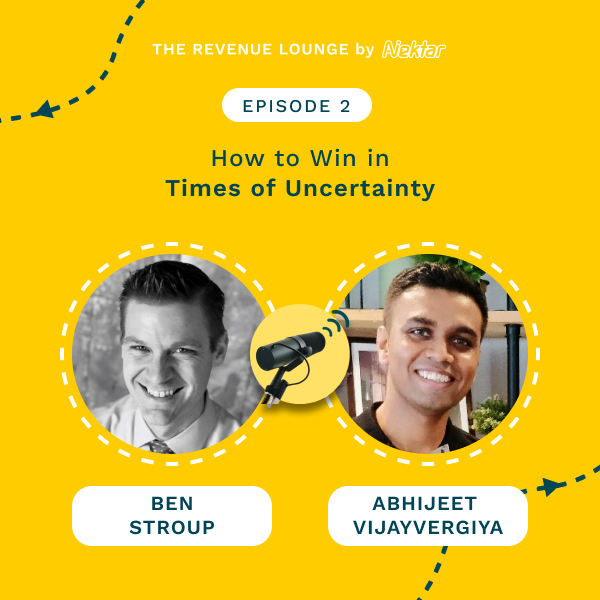
Ep #2: How to Win in Times of Uncertainty
Listen Now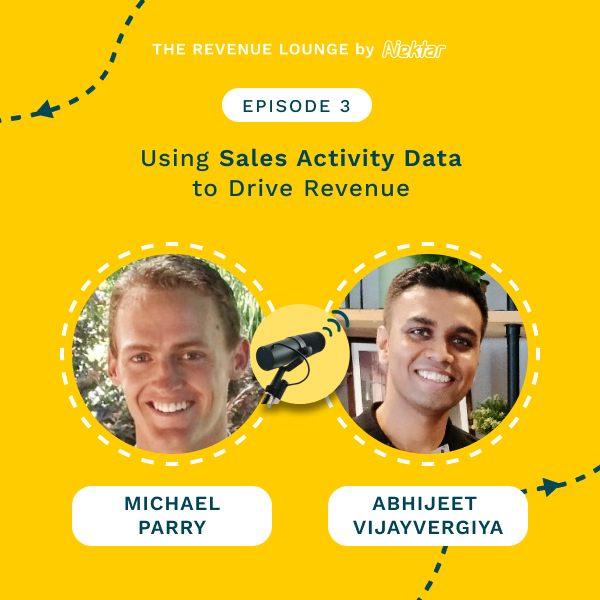
Ep #3: Using Activity Data to Drive Sales Productivity
Listen Now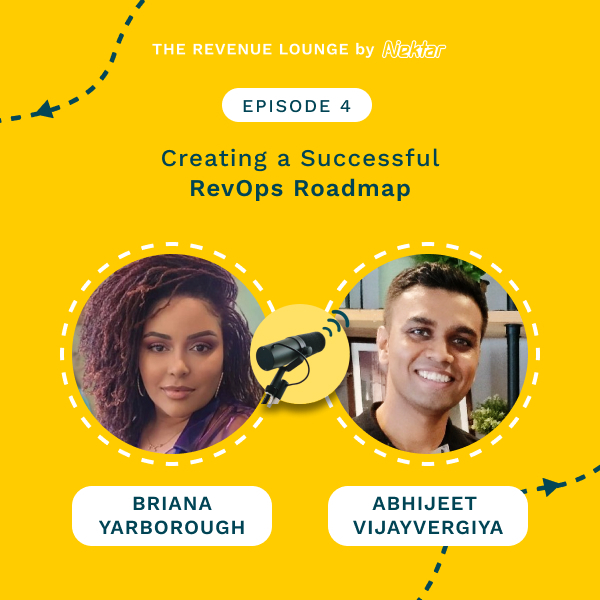
Ep #4: Creating a Successful RevOps Roadmap
Listen Now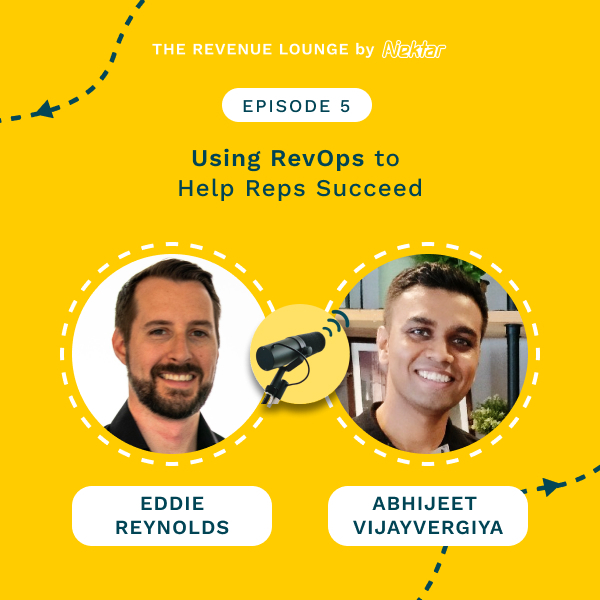
Ep #5: Using RevOps to Help Reps Succeed
Listen Now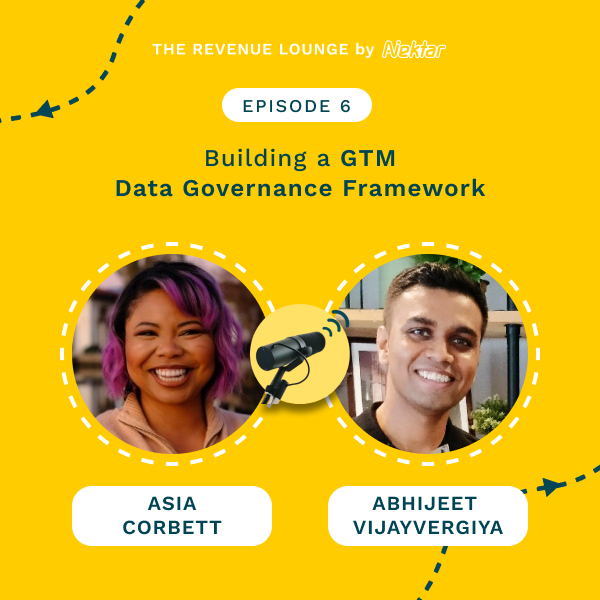
Ep #6: Building a GTM Data Governance Framework
Listen Now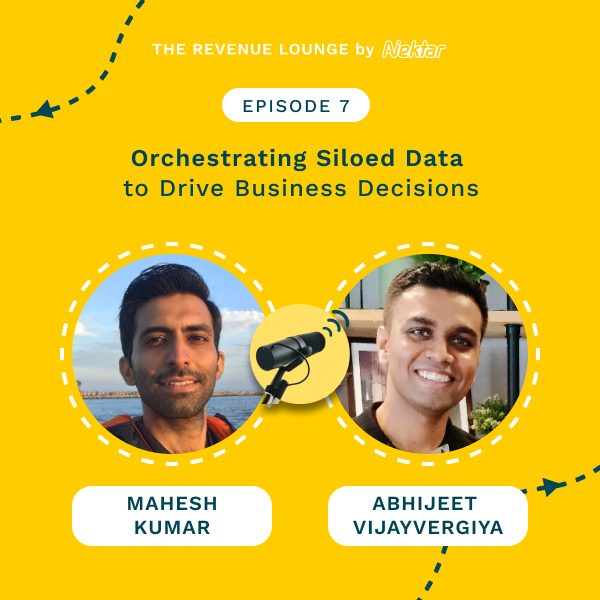
Ep #7: Orchestrating Siloed Data to Drive Business Decisions
Listen Now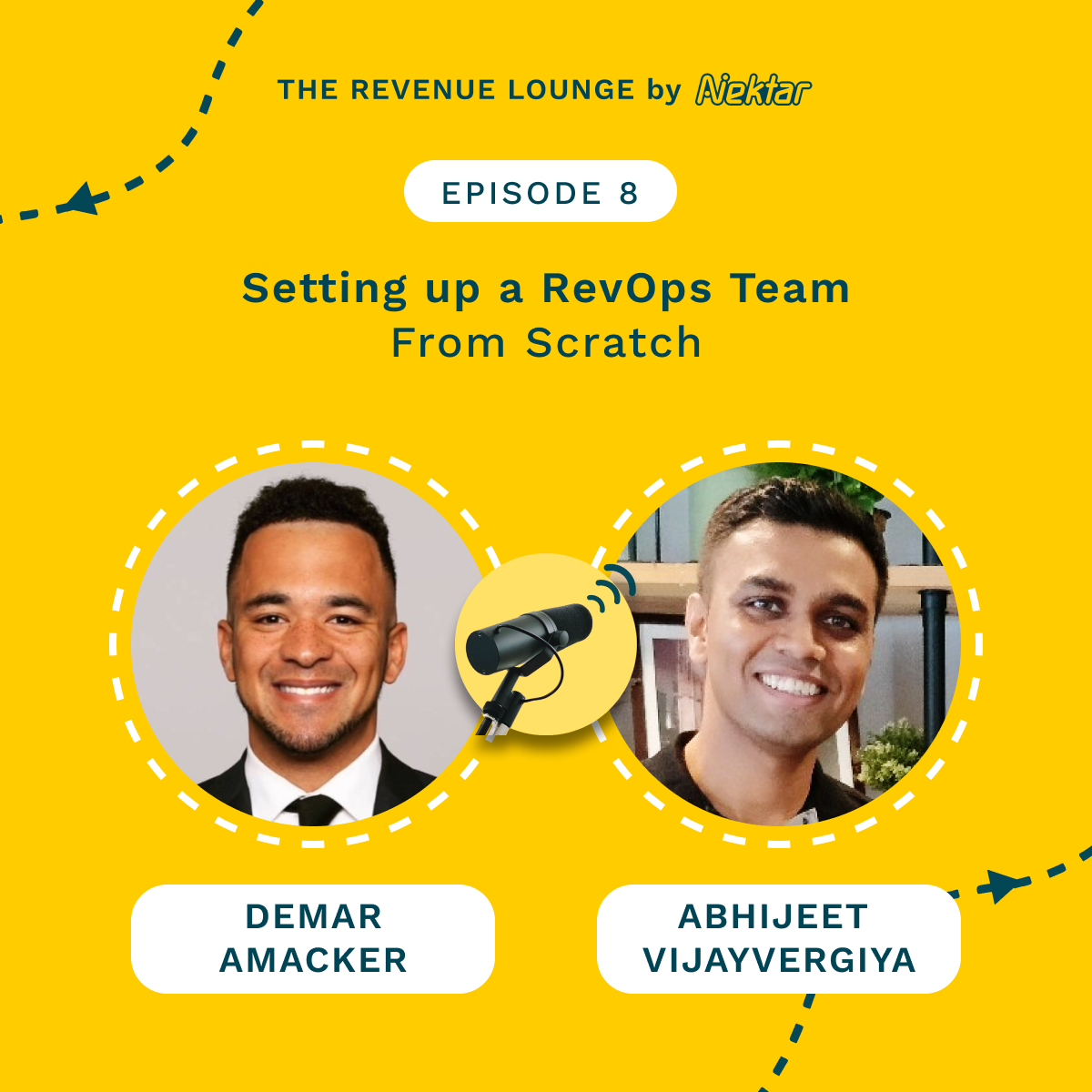
Ep #8: Setting Up a RevOps Team From Scratch
Listen Now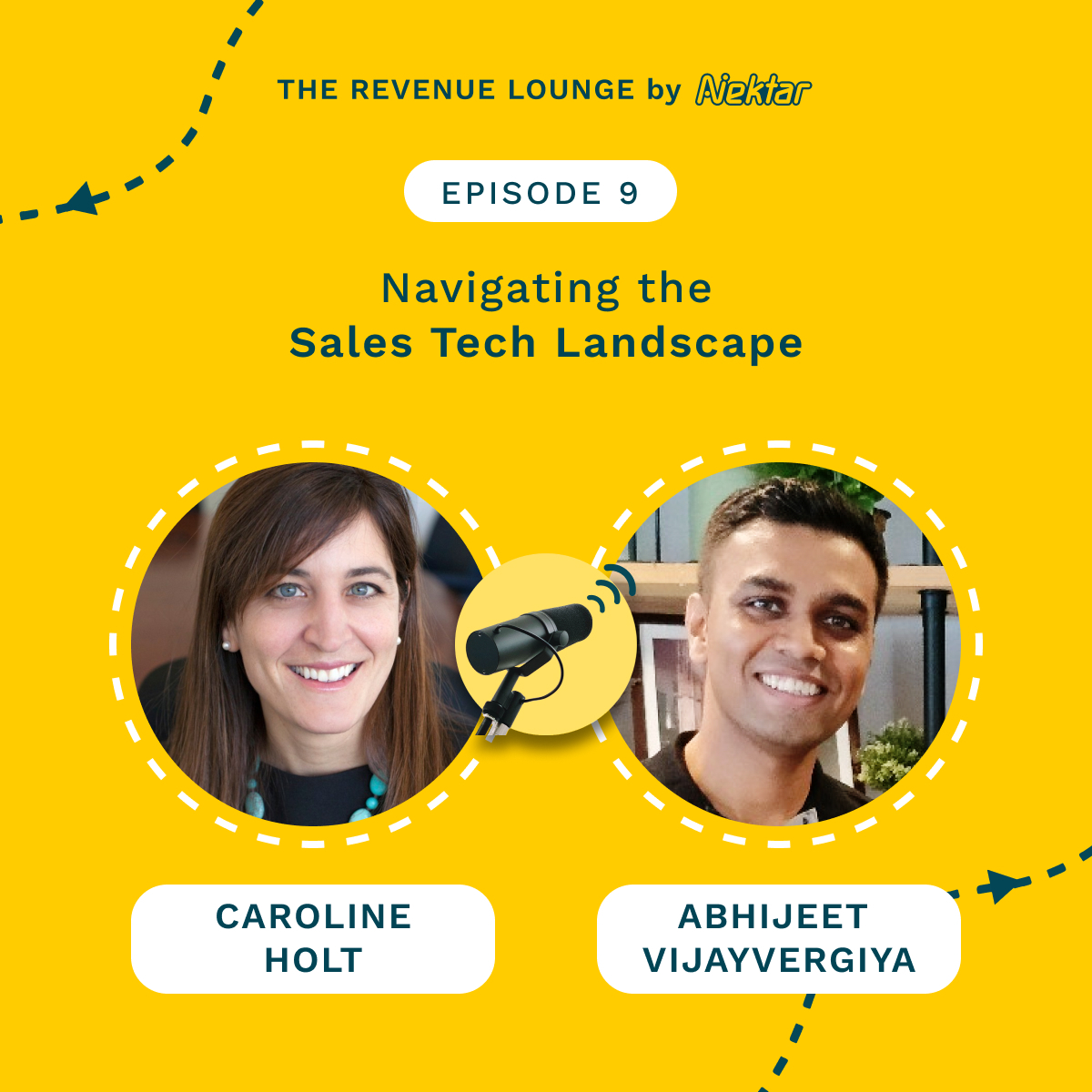
Ep #9: Navigating the Sales Tech Landscape
Listen Now